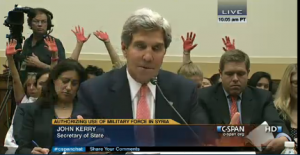One Potential Civil Liberties Bright Spot from Yesterday’s Shellacking: Thad Cochran
There has been a lot of belated attention to the impact that Mark Udall’s loss yesterday will have on the Senate Intelligence Committee. I’ve been pointing to the possibility of a Udall loss and a Richard Burr Chairmanship since March. I warned you all of this when there was still time to do something about it!
Yesterday’s election will have huge impact on intelligence matters. It’s crystal clear, for example, that Burr has zero intention of exercising any oversight into the intelligence community, as we know he has been uninterested in their law-breaking in the past. I actually think Burr may be more interested in their competence than Feinstein has been, but that may be just a pipe-dream.
Burr might even be the very very rare Gang of Four member who doesn’t use the position to leak what the intelligence community wants to make public to the press. I say that because Burr was a key player in requiring the White House to provide the committees a list of sanctioned leaks, which I actually think was a badly needed reform (though I have no idea whether the White House has complied).
There’s also the matter of the 3 or 4 new Republicans that will gain seats on the Intelligence Committee (adding at least one for the majority, along with replacing Saxby Chambliss and Tom Coburn, both of whom retired). It’d be nice to see a libertarian among these — perhaps someone like Mike Lee, given that Utah has a lot of intelligence equities. But I highly doubt Mitch McConnell would put anyone with an interest in civil liberties on the Committee.
But there is one area where yesterday’s shellacking might harbor good news for civil liberties: Thad Cochran.
With Republicans in the majority, Barb Mikulski (D-NSA) will lose her Chairmanship of the Appropriations Committee; Cochran is expected to get that Chair. Mikulski has always been — even more than Dianne Feinstein — the impediment to any real civil liberties change in the Senate, because she is far more powerful. Importantly, she served as a guarantee that smart policies put through on appropriations bills — like Alan Grayson’s elimination of a requirement that NIST consult with the NSA on encryption standards, and the Massie-Lofgren amendment to defund back door searches — would not make it into any final bill.
Losing the majority, even losing Mikulski on Appropriations on all other matters, is a huge loss, don’t get me wrong.
But it does mean that Thad Cochran might, just maybe, allow good things to move through the Senate on appropriations. With Barb Mikulski there was no chance in hell of doing something on an appropriations bill. Without her, there’s at least a possibility. (Remember that Ted Stevens permitted a Ron Wyden amendment defunding TIA to go through appropriations in 2003, so such things are not unheard of.)
There’s no reason to believe that Cochran, in general, is any friendlier to civil liberties than Mikulski. But he’s not the NSA’s own personal senator. And that may be a tiny bright spot.

